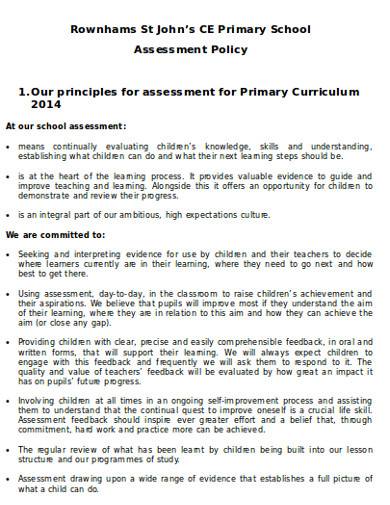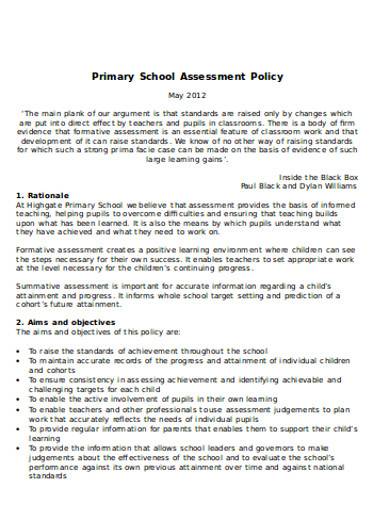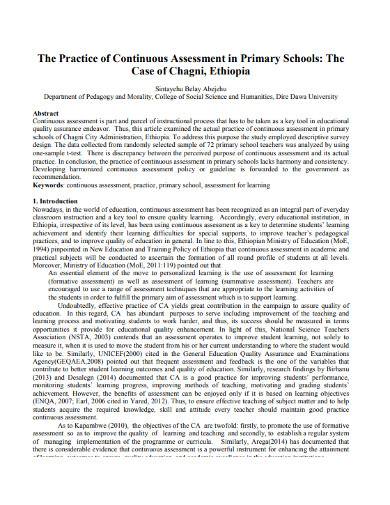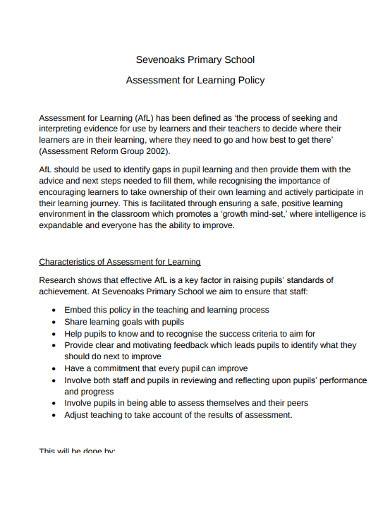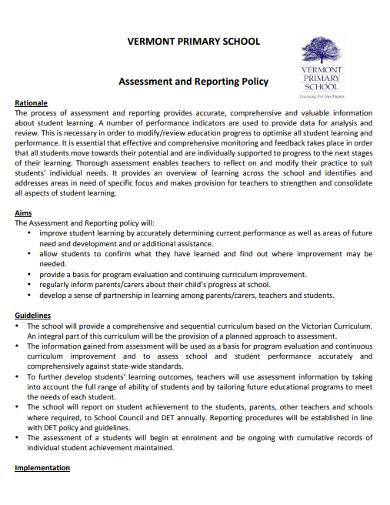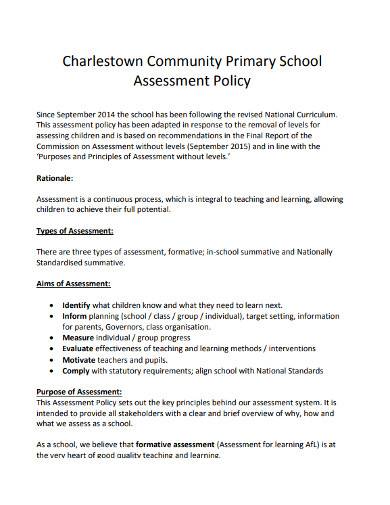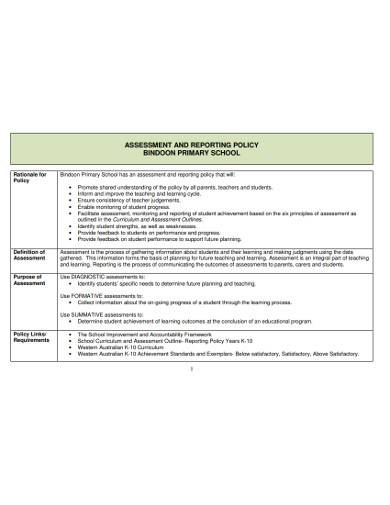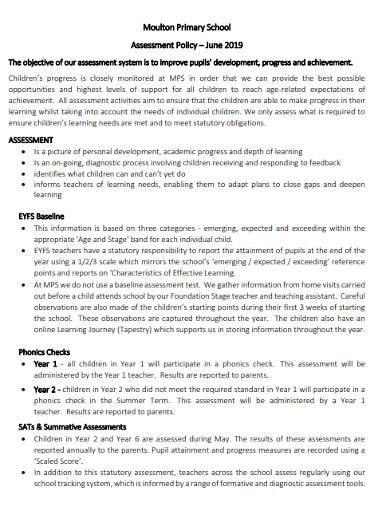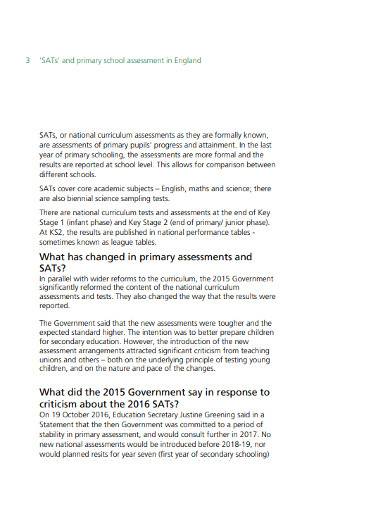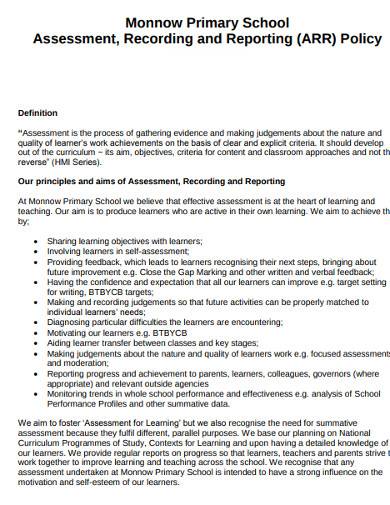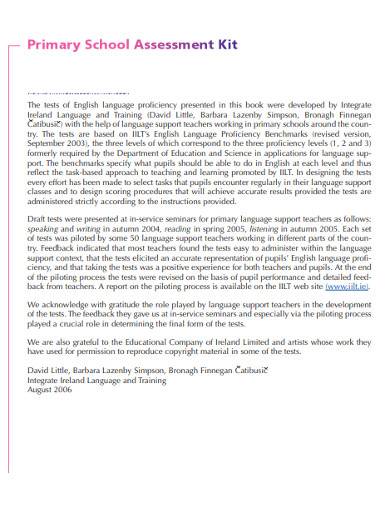Primary school is the first stage of formal education, typically beginning at the age of five or six, and lasting for five to seven years. During this time, elementary school students learn the basics of subjects such as reading, writing outlines, mathematics, and sample science, as well as social studies and other subjects. The primary school years are considered a crucial stage in a child’s development plan, as they lay the foundation for future learning and academic career success.
FREE 10+ Primary School Assessment Samples & Templates
1. Primary School Assessment Policy
2. Sample Primary School Assessment Policy
3. Primary School Assessment Template
4. Primary School Learning Assessment
5. Assessment and Reporting Policy
6. Community Primary School Assessment
7. Primary School Assessment and Reporting
8. Primary School Academic Assessment
9. Professional Primary School Assessment
10. Primary School Assessment Reporting Policy
11. Primary School Assessment kit
What Is Primary School Assessment?
Primary school assessment is the process of evaluating and measuring the knowledge transfer, skills development, and understanding of students in primary school. This can include a variety of different methods and tools, such as tests, quizzes, projects, observations, and performance evaluations. The purpose of primary school assessment is to provide teacher support and parents with information about a student’s progress and understanding of the material, as well as to identify areas where the student may need additional support or enrichment. Assessments can be used to inform instruction and to adjust the curriculum to better meet the needs of the students.
How to Make a Primary School Assessment
The purpose of assessment is to establish whether or not the objectives of education are being achieved, and as such, it is an essential component of the teaching process. The decisions that are made based on assessment are used to determine things like grades, placement, progression, instructional needs, curriculum, and in some situations, funding. Primary school assessment is important for several reasons:
Step 1: Identify Student Progress
Assessments provide teachers and parents with information about a student’s progress and understanding of the material, allowing them to identify areas where the student may need additional support or enrichment.
Step 2: Informing Instructions
Assessments can be used to inform instruction and to adjust the curriculum to better meet the needs of the students. This can help ensure that all students are challenged and engaged in their learning.
Step 3: Evaluate the Effectiveness
Assessments can be used to evaluate the effectiveness of instruction and to identify areas where instruction can be improved. Assessments help prepare students for future assessments, such as high-stakes standardized tests, by providing them with practice and experience in taking assessments.
Step 4: Meeting Accountability Requirements
Assessments are used to meet accountability requirements for schools and districts, such as state and federal accountability measures, by providing data on student performance. Assessments can also be used to identify students with special needs, such as learning disabilities, and to provide appropriate support and accommodations.
How often are primary school assessments conducted?
The frequency of primary school assessments can vary depending on the school and the subject. Some assessments may be conducted on a weekly or monthly basis, while others may be given at the end of a unit or quarter.
How are primary school assessments scored?
The scoring of primary school assessments can depend on the type of assessment and the learning objectives. Some assessments, such as multiple-choice tests, may be scored by a computer or by a teacher using a key. Essays and performance tasks may be scored by a teacher using a rubric or scoring guide.
Are primary school assessments standardized?
In general, assessment in elementary school is an important component of the learning process that plays an important role in ensuring that each and every student has the opportunity to realize their full potential. It’s worth noting that the way assessments are made could vary based on the country, state, or school district policies, regulations, and curriculum standards.
Related Posts
FREE 7+ Sample Student Self Assessment Templates in PDF MS ...
FREE 14+ Sample School Medical Forms in PDF MS Word
FREE 8+ Sample Teacher Self-Evaluation Forms in PDF
FREE 9+ Sample Property Assessment Templates in PDF
FREE 9+ Sample Student Evaluation Forms in MS Word PDF
FREE 5+ Sample Teacher Evaluation Forms in PDF
FREE What Is Evaluation? [ 11+ Samples ]
FREE 9+ Sample Needs Assessment Survey Templates in PDF MS ...
FREE 44+ Assessment Templates in PDF MS Word
FREE 9+ Sample Need Assessment Templates in MS Word PDF
FREE 11+ Construction Risk Assessment Samples in PDF MS Word
FREE 38+ Assessment Forms in Google Docs Word | Pages | PDF
FREE 7+ Sample Skills Assessment Templates in PDF MS Word ...
FREE 10+ Sample Project Assessment Templates in PDF MS Word ...
FREE 7+ Sample Teacher Self-Evaluation Forms in MS Word PDF

